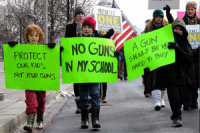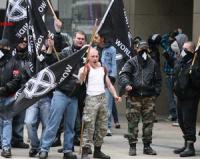-
Florida white supremacist group admits ties to Parkland School shooter
A spokesperson for the white supremacist group Republic of Florida (ROF) claimed to the Anti-Defamation League on Thursday that Nikolas Cruz, the man charged with the previous day’s deadly shooting spree at a Parkland, Florida, high school, was associated with his group. If Cruz’s role is confirmed, the Parkland school shooting would be the second school shooting by a white supremacist in the past two months. In December 2017, another young white supremacist, William Atchison, engaged in a shooting spree at a high school in northwest New Mexico, killing two students before shooting himself.
-
-
Why security measures won’t stop school shootings

When deadly school shootings like the one that took place on Valentine’s Day in Broward County, Florida occur, often they are followed by calls for more stringent security measures. While some of these measures seem sensible, overall there is little empirical evidence that such security measures decrease the likelihood of school shootings. Surveillance cameras were powerless to stop the carnage in Columbine and school lock-down policies did not save the children at Sandy Hook. We believe what is missing from the discussion is the idea of an educational response. Current policy responses do not address the fundamental question of why so many mass shootings take place in schools. To answer this question, we need to get to the heart of how students experience school and the meaning that schools have in American life. It is time to think about school shootings not as a problem of security, but also as a problem of education.
-
-
Studying patterns of domestic terrorism
University of Arkansas researchers recently received a $716,000 grant from the National Institute of Justice to study where terrorists prepare their acts as opposed to where they commit domestic acts of terrorism. The goals of the three-year study are to better understand spatial connections between a terrorism incident and the steps leading to it, and to create a model that could help assess terrorism risks for specific geographic areas or locations.
-
-
Vanessa Trump, Obama's D.C. office receive envelopes with suspicious white powder
The suspicious letter which was sent to Vanessa Trump, the wife of Donald Trump Jr., was postmarked from Boston and contained corn starch, law enforcement officials told CNN. Vanessa Trump and two other people were taken to New York Presbyterian-Weill Cornell Medical Center as a precautionary measure.
-
-
Experts: Drone incursion shows that Israeli-Iranian status quo is unsustainable
The incursion on an Iranian drone into Israeli airspace and the subsequent Israeli response on Saturday shows that Israel considers Iran’s efforts “to consolidate their strategic position” in Syria and Lebanon to threaten the Jewish state “unsustainable,” two experts say. They characterized the downing of the drone after it entered Israeli airspace and the subsequent attacks by the Israeli Air Force against targets in Syria as “the most significant clash to date between Israel and the so-called Axis of Resistance—Iran, Syria’s Assad regime and Hezbollah—since Iran began deploying soldiers and proxies to Syria six years ago.”
-
-
Six months after Charlottesville: America’s white supremacists face challenges, opportunities

The 11 August 2017 Unite the Right event in Charlottesville, Virginia, brought white supremacists of all stripes together for a weekend of protest that turned to deadly violence. Six months later, what has happened to the far-flung and disparate groups that make up America’s white supremacist movement? Analysts say that for America’s white supremacist movement, the period since Charlottesville has been a time marked by seismic structural shifts and more than a few power struggles. Divisions have deepened, and the spirit of solidarity that animated the racist crowds in Charlottesville has long since dissipated. And yet, by some measures, evidence of white supremacist activism and engagement is more conspicuous than ever before.
-
-
Distinct regional differences drive hate groups in the U.S.

In a new study, University of Utah geographers sought to understand the factors fueling hate across space. The researchers found that in all U.S. regions, less education, population change, and ethnic diversity correlated with more hate groups, as did areas with higher poverty rates and more conservative political affiliation. The Utah geographers assert that organized hate is motivated by the desire to protect a place from the perceived threats that “outsiders” pose to identity and socioeconomic security. The contemporary expression, “hate,” is shaped by the intermingling histories and present-day conditions of a place. A hate group is defined as an organized group or ideology with beliefs or practices that malign an entire class of people due to their immutable characteristics.
-
-
Students to help DHS S&T tackle air travel security issues
Students from James Madison University (JMU) will be tackling air travel security issues for the Department of Homeland Security (DHS) Science and Technology Directorate (S&T) as part of their spring semester of the Hacking 4 Defense (H4D) class. The H4D team will look for innovative approaches that will enable the Transportation Security Administration (TSA) to be able to associate passengers with their personal belongings.
-
-
Israel destroys Iranian drone, hits targets in Syria after losing F-16
For the first time, Iran sent a military drone from one of its bases in Syria, in response to which Israel, for the first time, bombed Iranian targets in Syria, killing several Iranian soldiers. An Israeli jet was shot down by an Iranian anti-aircraft missile, and in response Israel bombed and destroyed nearly half of Syria’s air defense systems, in addition to attacking other Syrian and Iranian targets.
-
-
Fmr. IDF intelligence chief: Shootdown of Iranian drone could be prelude to Israel-Shia war
The interception of an Iranian drone that targeted Israel suggests that the chances for a war between Israel and Iran-led forces, the first Israel-Shia war, have increased, General (ret.) Amos Yadlin, the former head of Israel’s military intelligence, said. “There is a determination by Iran to build a military force in Syria and Lebanon, and there is determination by Israel not to let it happen. And the two vectors are colliding,” Yadlin said. “Maybe instead of the first northern war, we should call it first Shia war, Israel-Shia war. Because it will be the Shia axis, led by Iran, with Hezbollah and the Syrian regime and Shia militia from all over the Middle East.”
-
-
Colombia's FARC suspends political campaign, citing threats, violence
The Colombian FARC’s political movement announced earlier today (Friday) that it was suspending its campaigning activities for the 9 March legislative elections because threats and violent protests have disrupted its rallies in several cities in Colombia. Two years ago the Colombian government signed a peace agreement with FARC, ending a violent insurgency which began in 1964. Colombian are evenly divided over whether or not an accord with FARC was a good idea, but polls show that the overwhelming majority of Colombians – around 80 percent — believe that even with a signed accord, former guerrilla members should be in prison, and, if not in prison, that they should at least not play a role in national politics.
-
-
S&T sponsors workshop on “sequences of interest”
Synthetic biology has led to the creation of new products, markets, companies, and industries. At the same time, the technology poses potential risks to biosafety and biosecurity, as recently demonstrated by the synthesis of horsepox virus, a cousin of variola, the virus which causes smallpox. DHS S&T sponsored a workshop to discuss the evolving role of databases which contain genetic sequences of pathogens and toxins — termed “sequences of interest” — which pose safety or security concerns.
-
-
ISIS fighters on migrant boats a “real risk”: Italy
Mediterranean migrant boats headed for Europe could be carrying fugitive ISIS fighters, Italian Foreign Minister Angelino Alfano has asserted at a Rome conference, where he has been hosting African, EU, and UN officials. “It is in our interests, to defeat the business model of traffickers whose profits are used to finance organized crime and, we have the evidence for this, terrorism,” Alfano said. Analysts note that as a result of increased operations by the EU’s border agency, Frontex, in the central Mediterranean, migration pressure has shifted west to Algeria and Morocco as migrants, still intent on reaching Europe, head for Spain, some via its African outposts of Ceuta and Melilla.
-
-
Confirmation: Assad has been using chemical weapons from stocks he pledged to relinquish in 2013
Labs performing scientific analysis for the UN chemical weapons watchdog have confirmed that the Assad regime has continued to use chemical weapons against Sunni civilians in Syria – chemical munitions from stocks which the regime was supposed to have relinquished in 2013. The analysis also concluded that it would have been virtually impossible for the anti-regime rebels to carry out a coordinated, large-scale chemical strikes with poisonous munitions, even if they had been able to steal the chemicals from the government’s stockpile.
-
-
Turkey’s foray into Somalia is a huge success, but there are risks
Turkey’s engagement with Somalia is striking for its brevity and ostensible success. Turkey has been involved in Somalia since just 2011, yet Ankara can point to a string of reported accomplishments and an arguably outsized presence in an often violent country regularly described as a failed state. Turkey’s presence in Somalia certainly embodies one of the most interesting regional geopolitical developments in the past decade. It also represents one of the most misunderstood and confusing. Why did Turkey choose Somalia? And, after its initial humanitarian intervention in 2011, what internal and external forces have shaped and expanded that involvement? Furthermore, what explains Turkey’s reported triumphs? Turkey’s actions have arguably improved the situation in Somalia over the past six years. This is because Ankara has actually attempted to assuage rather than solve Somalia’s long-standing problems outright. Investment is largely driven by profits and assistance is targeted, coordinated and based on needs. These interventions rarely come with the types of strings attached that characterize other efforts seeking to restructure Somalia. This has been welcomed by many Somalis for whom requirements for political reform or the creation of accountability mechanisms ring hollow.
-
- All
- Regional
- Water
- Biometrics
- Borders/Immig
- Business
- Cybersecurity
- Detection
- Disasters
- Government
- Infrastructure
- International
- Public health
- Public Safety
- Communication interoperabillity
- Emergency services
- Emergency medical services
- Fire
- First response
- IEDs
- Law Enforcement
- Law Enforcement Technology
- Military technology
- Nonlethal weapons
- Nuclear weapons
- Personal protection equipment
- Police
- Notification /alert systems
- Situational awareness
- Weapons systems
- Sci-Tech
- Sector Reports
- Surveillance
- Transportation
Advertising & Marketing: advertise@newswirepubs.com
Editorial: editor@newswirepubs.com
General: info@newswirepubs.com
2010-2011 © News Wire Publications, LLC News Wire Publications, LLC
220 Old Country Road | Suite 200 | Mineola | New York | 11501
Permissions and Policies
Editorial: editor@newswirepubs.com
General: info@newswirepubs.com
2010-2011 © News Wire Publications, LLC News Wire Publications, LLC
220 Old Country Road | Suite 200 | Mineola | New York | 11501
Permissions and Policies
